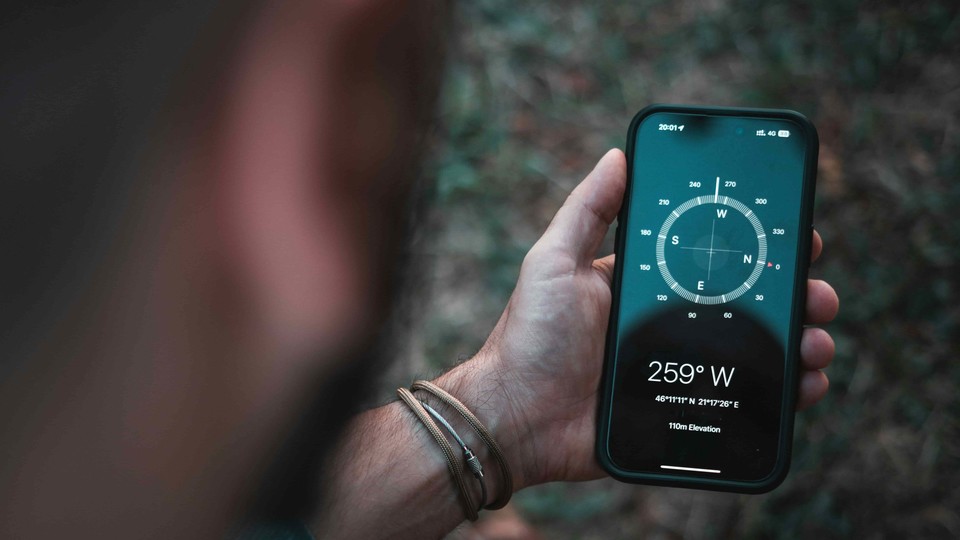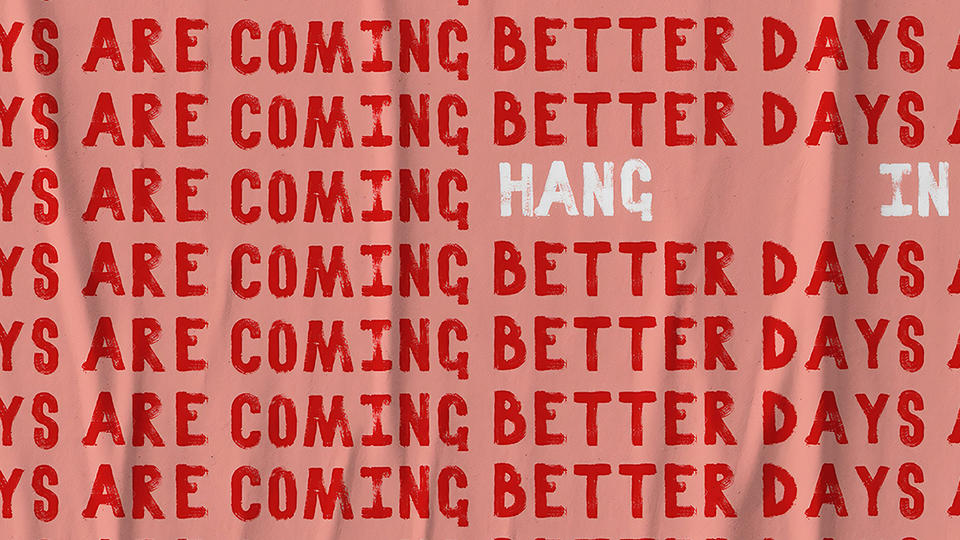Danger Zone
Why did areas that voted for the president worry less about COVID-19?
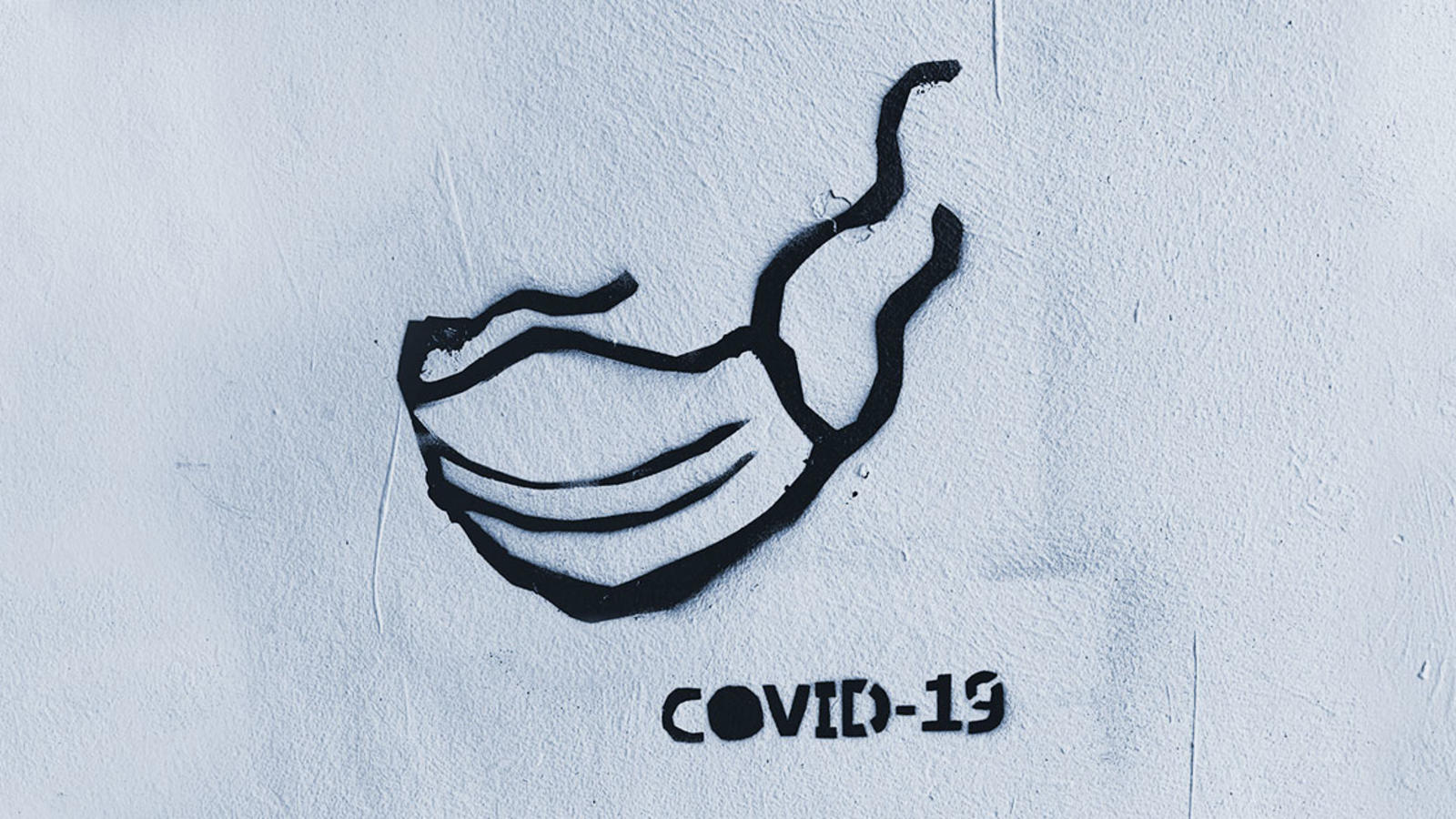
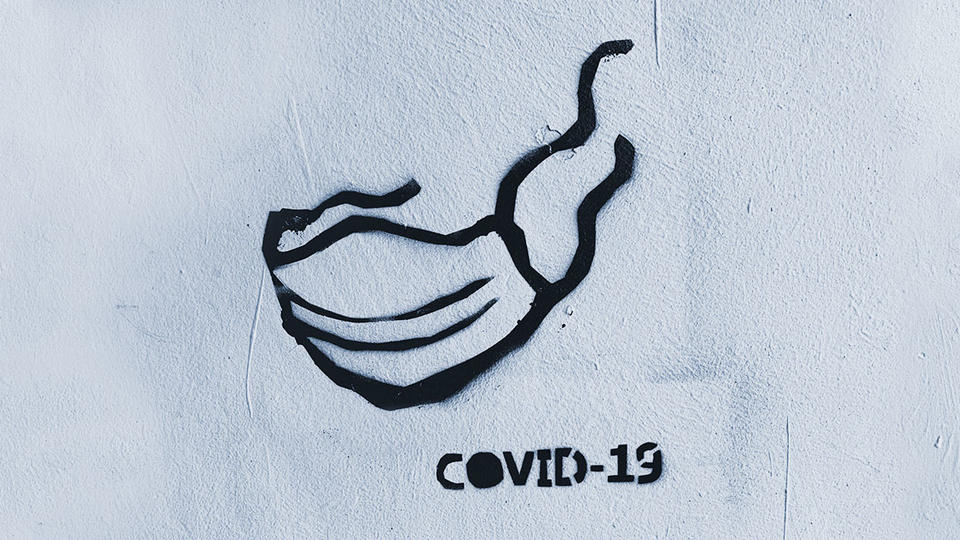
Q&A with Professor Yael Hochberg
Why Did Areas That Voted More For The President Worry Less About COVID-19?
The images flowing from Italy’s overburdened hospitals in mid-March and early April seemed to speak for themselves. Yet for weeks, and for some people, they did not. In a newly released study, Rice Business professor Yael Hochberg found that residents of counties with higher shares of Trump voters considered COVID-19 less risky than did residents of other counties — and practiced less social distancing to stop the virus from spreading.
In other words, America’s gaping political divide has affected how we’ve managed risk in the pandemic. The purpose of social distancing, of course, is to reduce the spread of COVID-19. So it matters whether people believe they need to take such precautions, said Hochberg and her coauthor, John Manuel Barrios of the University of Chicago’s Booth School of Business.
Here, Hochberg explains more about her research, how she captured and quantified her data so quickly — and what surprised her most.
RBW: What motivated your study?
YH: It mostly stemmed from conversations my coauthor and I were having about how different segments of society were reacting to the pandemic. We realized we had access to data that could answer some of our questions.
RBW: What data did you have in hand, exactly?
YH: What we had was anonymized data from a location data products company called Unacast, and data on Google search activity that we were using for other projects. We realized we could look at the share of search activity that had to do with the COVID-19 epidemic. And we had access to measures computed from location data from tens of millions of smartphones. You can see, for example, the daily distances people are traveling, and see what kinds of businesses they visit, and you can compare that by date.
So you can take a look at, say, Monday April 6 and compare that with all the Mondays from January to the end of February, before anyone was calling this a major crisis in the U.S. This is what Unacast does. Their data also codes up all the businesses, so you can characterize if they are essential businesses, such as a food store or a pharmacy. Other businesses — nail salons, sporting goods stores, bars, gyms, etc. — are labeled nonessential. And they compute the number of visits to nonessential businesses as compared to the same day of the week before the COVID-19 period.
How much people were searching for a topic is an indicator for how concerned they were about it, and the social distancing behaviors like visits to non-essential businesses are actual decisions that you make in the face of however you perceive the risk.
RBW: What was your main finding?
YH: What we found is that people of different political stripes appeared to perceive the risks of COVID-19 differently and adjust their behavior differently. In counties with the highest share of Trump voters, there were far fewer Google searches for information about the virus, and the social distancing response to coronavirus risk was 40 percent lower than in other counties.
RBW: How did you correlate political beliefs with search and travel habits?
YH: The data we had on search and social distancing was aggregated to the county level. Data from the 2016 election allows you to see the vote share for Donald Trump in a given county. What you see is that in the high Trump vote share areas, the proxies for perception of risk — searches for information about the virus, searches for economic impact, unemployment information — these searches, and thus the perception of risk, are lower. The cell phone data also show less social distancing in those counties in the early days of the pandemic.
RBW: What was your hypothesis?
YH: The hypothesis we had was that these choices were driven partly by political polarization, which results in people arriving at different interpretations of the same facts. There is a lot of research that shows increased polarization in the U.S., and how that plays into things like media consumption, and the fact that people are less likely to believe things that come from the opposing party. So, for example, if Fox News was downplaying the risk as opposed to CNN emphasizing the risk, and conservative politicians and President Trump were not talking about this in the same tone as media more associated with the Democratic Party, that could have an effect on how people who leaned Republican viewed the risks versus those who leaned Democrat.
What you see in the data is that when conservative politicians start to be affected by the virus and Fox media starts to change their tone, and Trump stands up and says this is an emergency, those counties suddenly amp up their social distancing. They start playing catch up, searching online for things more than the blue counties are, traveling less, etc.
RBW: What was the catalyst in changing behavior?
YH: We believe that when authority figures associated with a political party start saying, “This is not a hoax,” that’s when people affiliated with that party start to pay attention. One of the things that was really interesting was that even when the state governments were saying to stay home, counties with higher shares of Trump voters reduced their distances way less than other counties. But when the federal decree came, that’s when these counties changed their behaviors.
A likely channel for this is the media. Until your source of news and the people you consider credible say, “This is real, we should actually be worried,” there may not be a behavioral change. These behaviors change, though, the minute there is news, for example, that Ted Cruz is going into quarantine. There was nothing fundamentally different about medical information at that time, but when it hits a politician you support, and Fox News reports on it, that’s a big factor.
We didn’t have viewership data on Fox versus MSNBC, but we can see the ratio of searches for Fox News versus searches for MSNBC on Google. And where that ratio is higher, the social distancing was less and searches for the virus were less.
RBW: What was your takeaway?
YH: If you have a situation that you, as the policymaker, or governor, or head of state thinks is a serious situation, but that different people in the community are going to view differently because the people they consider authority figures say it’s being exaggerated, if, in that situation, you say, “We recommend you stay at home,” there are going to be people who say, “This is not a big deal.”
If there are people who don’t think the risk is all that high, and they engage in behavior that might expose other people to infection — whether it’s the kid who’s bringing your food through UberEats, the person who went to the pharmacy counter before you, the other person walking a dog in your building — if those people are not taking precautions, you have a problem. In other words, if people don’t have the same perception of risk this can be problematic.
RBW: Was there anything surprising to you about what you found?
YH: When all is said and done, you might think that your health in the face of a disease with a high fatality rate is a nonpartisan issue. The virus strikes where it will. If you tell me people have different outlooks on the economy based on who is in the White House, I wouldn’t be surprised. But you wouldn’t think reaction to a disease would get colored in a partisan way. We have all watched the death count from China and Italy, and you’d think after seeing that people would interpret the facts similarly. And they don’t.
We have no data indicating why political leaders took different attitudes, or whether they under- or over-reacted. But the fact that some people are not viewing the pandemic as seriously as others is pretty clear. All you have to do is look at what has happened in many U.S. cities. People have not stayed home. They don’t stay away from each other in the parks or on trails. People are not all following the “suggestions.” That’s why we concluded in our study that in such cases, the only way to shut that kind of behavior down may be to truly mandate and enforce stay-at-home orders.
Yael Hochberg is the Ralph S. O’Connor Professor in Entrepreneurship – Finance and the Head of Rice University Entrepreneurship Initiative.
Never Miss A Story
Keep Exploring
COVID-19 challenges deaf, hard of hearing college students
During the COVID-19 pandemic, colleges are learning about the extra assistance and needs of disabled communities with online learning. For the deaf and hard of hearing, captioning services and other accommodations are paramount.
Bending The Rules
Sometimes it's right to do the wrong thing.


By Deborah Lynn Blumberg
Sometimes It’s Right To Do The Wrong Thing
The rules are right there on the company website: At Houston running store Fleet Feet, you’re allowed only 60 days to exchange shoes or to get a full refund.
In 2019, though, general manager Danny Braden intentionally violated that policy. He allowed a woman to return shoes a full year after purchase when she explained that she was struggling after losing her husband. It wasn’t the first time Braden had broken the rules. In fact, he encourages, even trains, his employees to do the same — as long, he emphasizes, as it’s safe for everyone and helps a customer.
In the era of coronavirus, some rules are non-negotiable. Enforcing social distancing or hand washing can be matters of sickness or health. But in retail, thankfully, few rules carry anywhere near that kind of weight.
“A lot of times our rules are arbitrary,” says Braden, who manages five Fleet Feet locations in the Houston metro area. “We bend rules a lot. We want our customers to be happy.”
A surprising number of companies acknowledge the same thing: allowing what some might call unethical customer conduct can be good for business. From clothes stores to websites to streaming services, organizations across industries knowingly permit — even encourage — customers to break nonessential rules.
Fast food restaurant Popeyes recently wove rule-breaking into an advertising campaign, announcing that the first 1,000 people who tweeted a picture of themselves eating a Popeyes meal with the hashtag #ThatPasswordFromPopeyes would get the company’s Netflix username and password.
Of course, Netflix has for years allowed users to share accounts, knowing full well that they’re losing hundreds of millions of dollars in the process. Restaurants gamely comp meals to dissatisfied customers even when their complaints are groundless. Target also partakes in harmless rule-bending, honoring the one year guarantee on its Cat & Jack kids’ clothing brand even when the returned shirt or shorts clearly has done a full tour of duty in art class or on the jungle gym.
Rice Business professor Utpal Dholakia has studied this type of benign indulgence — and supports it. While most business owners believe they shouldn’t allow unethical behavior, Dholakia says their attitude could be hurting their companies.
“If allowing people to return items or giving them freebies keeps them coming back and spending money,” he notes, “it will actually help the business in the long run.”
Higher Revenues
In a study of a Swiss online retailer, Dholakia and colleagues Zhao Yang and René Algesheimer of the University of Zurich found the company earned more and got better customer engagement when it let consumers register multiple accounts in an effort to qualify for free gifts. Though that clearly violated company policy, the rule breaking signaled a sort of devotion, the researchers discovered. The people who broke the rule were actually more engaged with the retailer’s website than were other shoppers — and they spent more money.
In Ann Arbor, Michigan, the Zingerman’s deli food chain has long folded this insight into its business model. Cofounder Ari Weinzweig actively encourages his 700-plus employees to break company rules in the name of customer service. The only caveat: never compromise the health or safety of customers or the community.
To clarify the distinction, Weinzweig teaches responsible rule breaking as part of employee training. “We’re socialized to believe breaking a rule means getting in trouble,” he says. “Rules are in place for good reason, and you need to be mindful.”
When Zingerman’s is open for business, the customer rules. Crave something off-menu? They’ll try to supply it. Need smoked salmon before opening hours? They let you in. Even clients determined to get a reservation despite a no-reservations policy can get their name on a list.
This commitment to bending the rules while complying with safety laws has helped Zingerman’s earn over $65 million dollars in annual revenue, Weinzweig says.
Rules Are For The Rogue Minority
Even libraries — generally bastions of propriety — have loosened up on rules to lure students tempted elsewhere by digital technologies.
Flouting years of tradition, Rice University’s Fondren Library, when it’s open, now encourages users to bring food and drinks into parts of the library. Librarians who might have scolded visitors hiding candy or smuggling coffee are now instructed to welcome them.
“We know people spending time in the library want to have something to drink and eat, so we’re allowing certain things in,” says Sandi Edwards, Assistant University Librarian for Research Services.
Rules, of course, exist for a reason: In business, they help set customer expectations and guide employees in performing work well. They cut down on errors and protect the health of workers and clients. They also can set the tone for how a business conducts itself, so that when conflict arises, employees look to the rules for guidance.
But when rules are vague or outdated, they can needlessly drive customers off, says Jeanne Bliss, a consultant who was the inaugural chief customer officer at Lands’ End, Coldwell Banker, Allstate and Microsoft.
In a retail setting, Bliss says, perceived fairness is a huge driver of customer satisfaction. Customers want to feel they are being treated fairly. Often that means harmless bending or breaking of rules.
So how should businesses split the difference? The first step is to ensure customer and community safety. Next, identify the top exceptions customers request, then guide employees how to respond.
The healthcare industry, for example, distinguishes between red and blue rules. Red rules, such as no smoking where oxygen is being use, protect people and must never be broken. Blue rules, on the other hand, such as filling out admitting paperwork before treatment, are frequently broken in emergency situations.
Dealing With Digital Rule Breakers
Dholakia argues that businesses should make similar priorities. While, for example, absconding with sparkling water from Trader Joe’s is illegal, some businesses purposefully let shoplifters walk out to protect employee safety.
The digital age has ushered in new examples of permitting questionable customer behavior. Newspapers such as The New York Times or the Wall Street Journal often look the other way when readers dole out subscription login details to friends and family. The reasoning? Those non-paying readers are seeing ads — and might become paying readers themselves one day.
Streaming services are the same. Netflix doesn’t bother to crack down on the 12 percent of their viewers who aren’t paying for the service, though it costs the company a reported $500 million a year in revenue. Instead, like other services, Netflix merely limits the number of screens one password can access at any time. Across the streaming industry, a 2014 poll by Consumer Reports showed, a full 46 percent of streaming users were sharing an account with someone outside their household.
At Zingerman’s in Michigan, where customers often insist on using expired coupons, staffers are trained to cheerfully give partial value. Recently, founder Weinzweig says, a customer who benefited from that indulgence then bought two extra bottles of balsamic vinegar. “I’m not saying break every rule every time,” he says. “That’s chaos. Part of leadership is knowing when it’s okay to break them.”
Utpal M. Dholakia is the George R. Brown Professor of Marketing at Jones Graduate School of Business at Rice University.
Deborah Lynn Blumberg is a Houston-based freelance writer specializing in business, finance and health and wellness whose work has appeared in publications including The Wall Street Journal, MarketWatch, The Christian Science Monitor and Newsday. Previously, she was a reporter at Dow Jones/The Wall Street Journal. (deborahlynnblumberg.com; @dlblumberg).
Never Miss A Story
You May Also Like
Keep Exploring
Campus Kindness: Snacks for hospital workers and a boost for businesses: Jones School students team up to help out
A pair of Rice MBA students are using their business skills to give medical staff and the economy a boost amid the COVID-19 pandemic. Coco Ma and Kathleen Harcourt have created a nonprofit organization, #SnacksForMedStaff, that delivers free meals to medical staff who are treating patients infected with the virus.
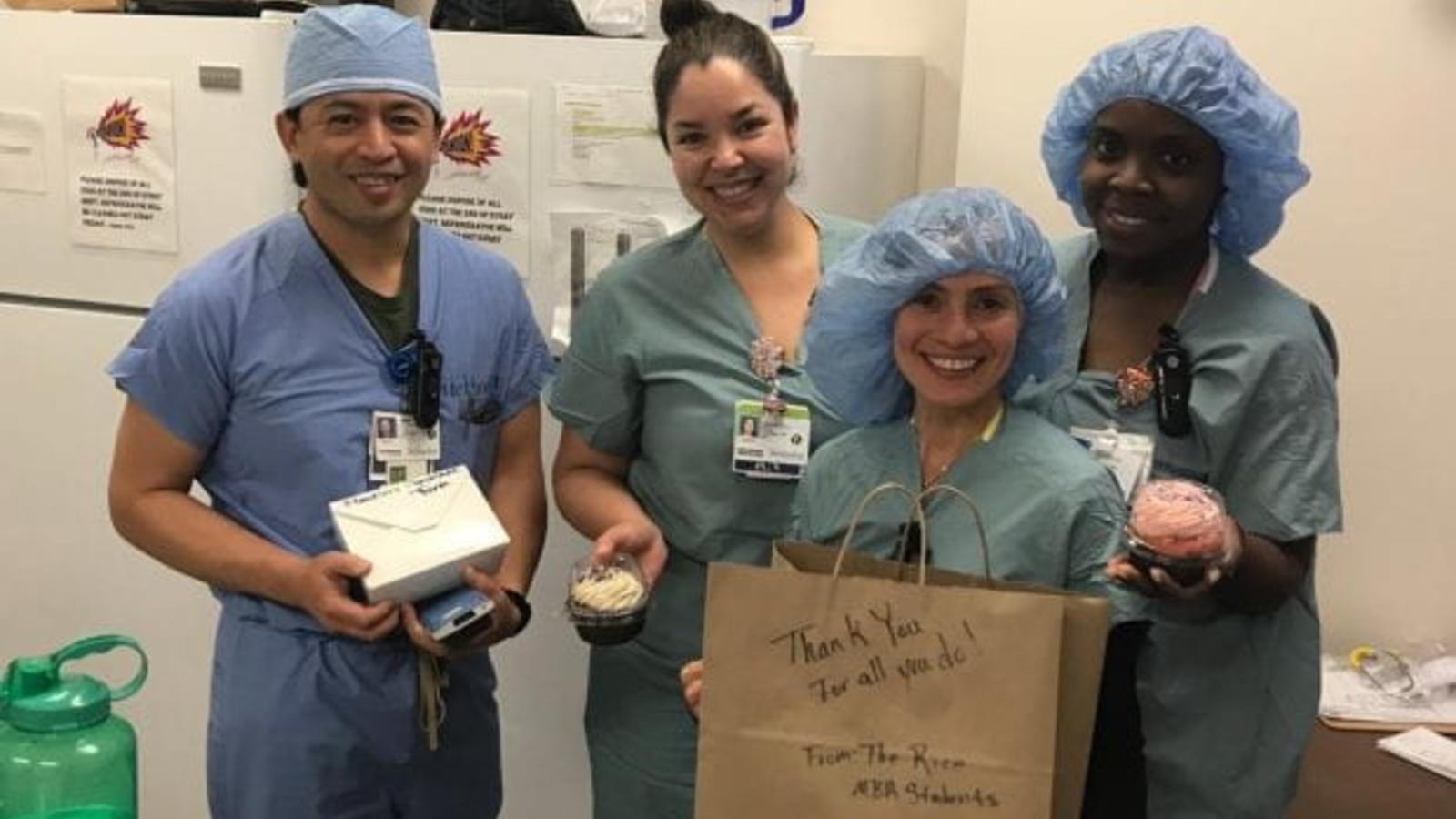

Campus Kindness is a series of features on Rice Owls contributing to the fight against COVID-19. Read more here.
A pair of Rice MBA students are using their business skills to give medical staff and the economy a boost amid the COVID-19 pandemic.
Coco Ma and Kathleen Harcourt have created a nonprofit organization, #SnacksForMedStaff, that delivers free meals to medical staff who are treating patients infected with the virus.
“Medical staff are making tough choices and working hard to protect our community,” said Ma, who is specializing in marketing and entrepreneurship at the Jones Graduate School of Business.
The nonprofit has raised more than $14,000 through word of mouth and an online fundraising campaign. The money is used to buy meals and energy drinks from restaurants and stores and deliver them through services such as Uber Eats and DoorDash to hospitals in Houston and around the country.
Meal packages have been delivered to several Houston area hospitals including Houston Methodist, Ben Taub, Memorial Hermann The Woodlands, Lyndon B. Johnson, Davam Urgent Care, Aspire and HCA Houston Healthcare in Conroe. Deliveries have also been made to hospitals in New York, Michigan and California.
The response from medical staff has been heartwarming. “They always tell us how incredibly grateful they are and how much it means to them that we are doing this,” said Harcourt, who is studying finance at the Jones School. “Many of them are stressed out and exhausted, and receiving a small token of thanks really lifts their spirits to keep going forward. We have had a few times where tears were brought to their eyes because someone had thought of them.”
Taking care of health care workers is dear to Ma, who grew up in Hangzhou, China, where her mother is a hospital administrator.
“In the past two months, I have seen so many heartbreaking stories about front-line medical workers passing away due to coronavirus,” she said. “Many health care workers had mental or physical breakdowns because they lacked personal protective equipment and (had) heavy workloads.”
Ma said her mother’s hospital has treated thousands of COVID-19 patients. “I remember one day my mom sent me a message saying she went to work that morning but the hospital couldn’t give her a mask because they had run out,” she said. “But everyone still worked hard to treat patients like any other day.”
After watching Chinese media coverage of people sending food and energy drinks to health care workers there, Ma proposed doing something similar in the United States. Harcourt loved the idea.
“At first, we only intended to spend our money and just send a few meals, but once our classmates found out what we were doing, they started giving donations and sending us contacts at hospitals, and one student, Eric Schumacker, spent a lot of time creating our website,” Harcourt said.
#SnacksForMedStaff, she said, has given her and Ma a sense that they are making a difference.
“We wanted to do something good for the community,” Harcourt said. “We were feeling down about how hospital workers were experiencing sometimes warlike situations with COVID-19 and how small businesses were closing and leaving people unemployed. This nonprofit has empowered us to do something about it.”
David Medina is director of Multicultural Community Relations in Rice’s Office of Public Affairs.
Negotiating the new normal: How Jones School MBA course negotiated transition to online learning
The COVID-19 pandemic has shifted work, school and social lives online, demanding everyone leave their comfort zones of routine and predictability. Jing Zhou, a professor of organizational behavior, found herself stretching her creative muscles to convert an in-person MBA course to online.
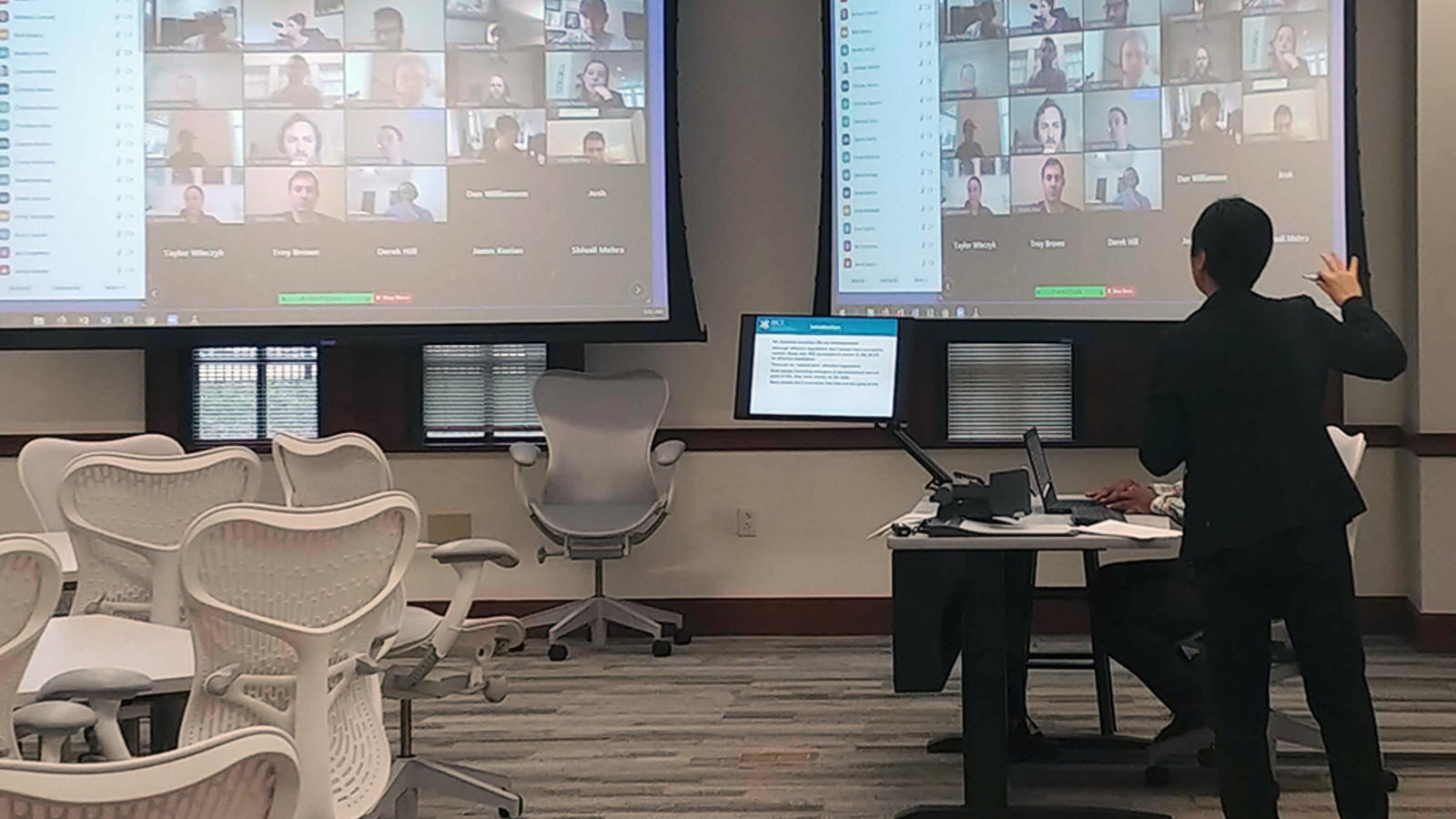
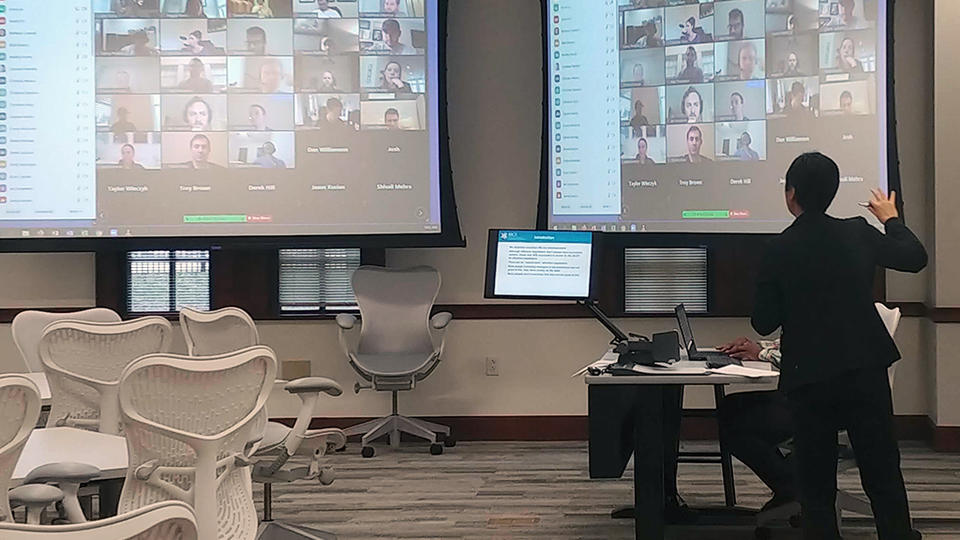
The COVID-19 pandemic has shifted work, school and social lives online, demanding everyone leave their comfort zones of routine and predictability. Jing Zhou, a professor of management at Rice’s Jones Graduate School of Business who’s an organizational behavior expert, found herself stretching her creative muscles to convert an in-person MBA course to online.
Her course Negotiations is taught as an Intensive Learning Experience (ILE), which Zhou considers “the best way of closing the knowing-doing gap — the course helps (students) to not only understand and appreciate negotiation concepts and frameworks, but also use the concepts and frameworks as foundations for building and executing their strategies for a specific negotiation.”
The class is part of the professional MBA program at the Jones School, and students are working professionals. Typically they take the course on evenings or weekends, participating in back-to-back class days. During those two days, the students practice negotiation exercises and discuss or effective or ineffective strategies. Zhou says this ILE has been one of the “secret sauces in the program because of its rich content and rigorous pedagogy.”
These factors make the class seemingly impossible to convert to an online format. Nonetheless, to keep teaching in the current climate, the Jones School went forward with the originally scheduled dates (March 13 and 14) and moved the class online. It was a team effort — Zhou presented her teaching plan to colleagues from various departments who helped her figure out how to make it work.
Zhou chose to teach the class from one of the executive education classrooms at McNair Hall, home of the Jones School, because a remote teaching setup was already in place there. “When I teach, I like to walk around and write things on the board, and teaching in a real classroom allowed me to hold some things constant amongst a sea of change,” she said.
Given the nature of the class, the students virtually moved among small-group “breakout rooms” and the main “classroom.” They engaged in individual preparation, team preparation, negotiations of all sizes and configurations, and whole-class discussion.
Thanks to technology, the class continued almost unchanged. Zhou had to adjust the social aspects of teaching, like picking up on nonverbal cues from students. “When I can only see faces on a screen, I can’t read any nonverbal cues and, hence, the need to pose the same question in different ways, or repeat key takeaways to make sure they fully understand the course concepts and frameworks,” she said.
When Houston city leaders issued a stay-at-home order March 24, Zhou could no longer use the technology at the Jones School and had to convert her class to be even more remote for the next section on April 4 and 5.
“In the following days, I had tutorial sessions with IT and trial runs with a group of Jones School staff to practice various tech features,” Zhou said. “I had to go from a tech dummy who needed her teenage son’s help to set up a WhatsApp account, to someone who now feels pretty comfortable navigating various features in Zoom and syncing a laptop with (a Microsoft) Surface Pro to run a complex class.”
Due to the unusual circumstances, the Jones School offered students the option to attend online or postpone until they could take it in person. Twenty students out of the original 80 decided to participate online.
“Knowing it would be the smallest Negotiations ILE I’d ever taught, I didn’t know what to expect, and frankly was a bit worried about whether the quality of discussion would meet Rice Business’ high standards,” Zhou said.
But it worked. Students were engaged and actively participated, even with Zhou changing her teaching style.
“Sitting at home in front of a couple of computers is not my preference; I draw energy from walking around,” she said. “So knowing I would have to sit and teach, I needed to energize myself psychologically. I dressed up as if I were teaching in the classroom. This helped me to activate my professional identity, and generate psychological energy to do a great job. In addition to a teaching plan, I also created a very detailed class timeline and shared it, in advance, with all students. I felt this helped us to use time efficiently.”
Studies have found that physical settings influence cognitive thinking, according to Zhou, and the change of physical settings could affect divergent thinking and new insights. So, she theorized, it may be beneficial to blend online classes with face-to-face instruction to encourage new thinking.
As people adjust to stay-at-home measures, she notes, they’re searching for ways to encourage motivation and creativity.
“I hope this experience makes people aware that being creative requires much more than telling oneself ‘be creative now,’” Zhou said. “There are strategies that facilitate idea generation, idea evaluation and idea implementation, but most people have never learned those skills and could get frustrated easily after they realize their efforts at forcing creative do not produce great ideas or projects.”
Her advice isn’t just for those who are acclimating to working from home or those attempting a new passion project, but also for organizations.
“I believe people who are willing to learn will realize there are existing processes that need improvement,” she said. “Leaders will need to analyze which part of their existing processes are not efficient and need to be eliminated — and they should use creative thinking skills to engage in process innovation.”
Democrats Split Over Scope of Coronavirus Oversight
John Barrios and Yael V. Hochberg used cellphone-tracking data and internet searches to find that Trump voters were less concerned about the virus than others, as measured by searches about the virus, distance traveled and visits to nonessential businesses.
Houston companies will win the COVID-19 battle: Here’s why
During these tough times, there is solid cause for optimism, because Houston companies are battle-tested and uniquely poised to win the war against COVID-19. Here are five strengths of Houston businesses that will help them bounce back.
I’ve Filed For Unemployment. Now What?
Even Larry Stuart, a practicing board-certified labor-and-employment lawyer with Stuart PC and adjunct professor in management Rice University’s Jones School of Business, admits it can be perplexing. “There’s a lot of confusion, there’s a lot of action, there’s a lot of change and there’s a lot of stuff in flux,” he says. “People are understandably confused.”
Hardship presents opportunity for creativity, Rice Business experts say
The massive disruption of our social and work lives is unnerving, but there are benefits to shaking up our routines and feeling uncomfortable, according to experts at the Jones Graduate School of Business. Scott Sonenshein and Jing Zhou, professors of management, are available to talk about the evolving organizational landscape with news media.
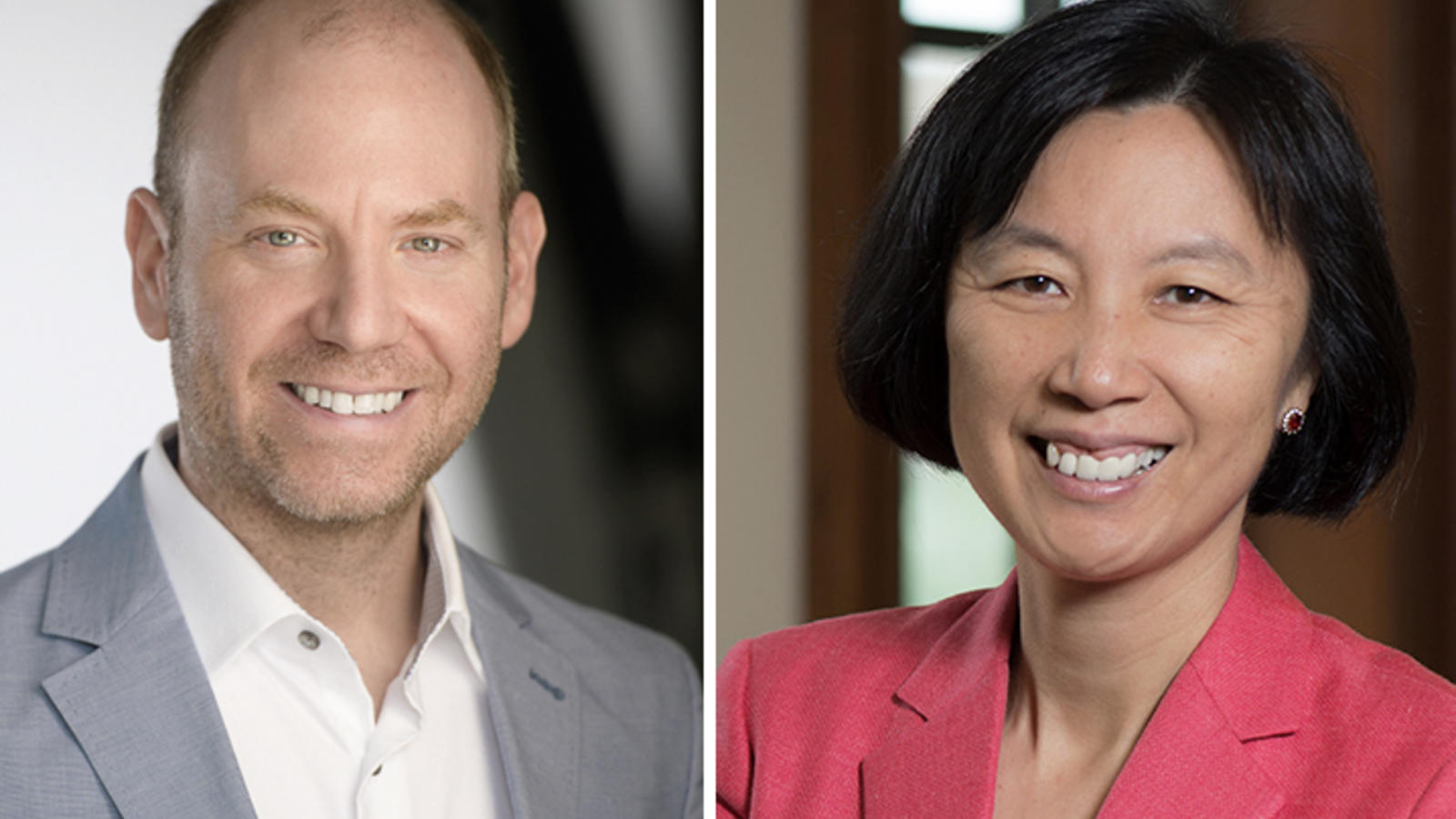

The massive disruption of our social and work lives is unnerving, but there are benefits to shaking up our routines and feeling uncomfortable, according to experts at Rice University’s Jones Graduate School of Business.
Scott Sonenshein and Jing Zhou, professors of management at the Jones School, are available to talk about the evolving organizational landscape with news media.
“I’ve studied creativity for more than two decades, and my research shows that times of disruption and upheaval can lead us to new insights and nudge us to innovate in ways we’d never have considered before,” Zhou wrote in an op-ed for The Hill. “In many ways, it’s an opportunity in disguise.”
In the midst of a pandemic, it might seem difficult to shift gears and work on a creative outlet, but it is possible to channel that angst while working from home, according to Zhou. “One of the best ways to achieve this psychological freedom — and the creativity it fosters — is to isolate ourselves,” she wrote. “Many of us intentionally seek out solitude for this very reason.”
Sonenshein, the bestselling author who co-wrote the recently published book “Joy at Work: Organizing Your Professional Life” with Marie Kondo, agrees that hardship presents opportunity, even if you don’t have the perfect at-home work setup.
“Research shows that times of crisis can bring out hidden reserves of human resourcefulness — and we’re starting to see what happens when humanity comes up against seemingly insurmountable constraints,” Sonenshein wrote in a separate op-ed for The Hill.
This resourcefulness ranges from scientists working on vaccines at record speed to automotive manufacturers pivoting to produce ventilators to restaurants converting to a takeout model.
“When resources are scarce, it becomes easier to discard conventional thinking and invent new uses for what we already have,” Sonenshein wrote. “But first we have to adjust our mindset to see the possibilities inherent in hardship — and not just the problems.”
Instead of becoming rigid in our thinking and trying to create perfect plans, Sonenshein urges us all to get more comfortable with improvising: “When we emerge from this crisis, I hope we leave it with an important lesson. When we are resourceful, we can do more than we ever imagined.”
“My research shows that people, and entire cultures, can produce some of their most creative works in times of crisis,” Zhou wrote.
Sonenshein is the Henry Gardiner Symonds Professor of Management at Rice. He is the author of “Stretch: Unlock the Power of Less — And Achieve More Than You Ever Imagined.”
Zhou is the Mary Gibbs Jones Professor of Management, the organizational behavior area coordinator, director for Asian management research and education and director of the Ph.D. program at the Jones School. She is a fellow of American Psychological Association, the Association for Psychological Sciences and the Society for Industrial and Organizational Psychology.
To schedule an interview with Sonenshein or Zhou or for more information, contact Avery Franklin, media relations specialist at Rice, at averyrf@rice.edu or 713-348-6327.
Related materials:
- Sonenshein bio: https://business.rice.edu/person/scott-sonenshein
- Zhou bio: https://business.rice.edu/person/jing-zhou
- Follow Rice Business via Twitter @Rice_Biz.
- Follow Rice News and Media Relations via Twitter @RiceUNews.
Hidden Costs
Avoiding taxes can have unintended consequences.


Based on research by Karthik Balakrishnan, Jennifer L. Blouin and Wayne R. Guay
Avoiding Taxes Can Have Unintended Consequences
- Corporations that prioritize tax-avoidant strategies more than their peers are considered "tax aggressive."
- Tax aggressiveness comes at the cost of lower corporate transparency.
- Analysts make more, and more varied, errors when evaluating tax aggressive corporations.
Do you know how much tax ExxonMobil pays? Chevron? Bank of America? You probably don't. Depending on the company, even the most astute analyst may not either.
Let's try an easier question. If you compare a large, multinational corporation with a local pizza chain, you might suspect the multinational pays proportionally less tax than the pizza joint. You may be right — but you’d have a hard time proving it.
Rice Business professor Karthik Balakrishnan, along with Jennifer L. Blouin and Wayne R. Guay from the University of Pennsylvania, developed a sophisticated method to prove the real costs of corporate tax policy. Specifically, they devised a mathematical formula that measures tax aggressiveness, the extent to which a corporation uses strategies to pay less tax than its peers.
In a key innovation, the model that Balakrishnan and his colleagues created didn’t initially compare businesses like the multinational to those like the pizza chain. Instead, they built the formula to include comparable corporation size and industry into the measure of tax aggressiveness. A domestic pharmaceutical company, they point out, will have a lower tax rate than a domestic food distributor, simply because the pharma company is likely eligible for greater research and development tax credits. This is the reason that individual tax rates alone don’t show if either the pharma company or the food distributor is being particularly aggressive.
Businesses of all sizes, as well as individuals, engage in tax strategy: finding ways to lower the amount of tax they need to pay. But large corporations can be more aggressive than our restaurant chainlet because a corporation has the money to pay associated costs. These might include hiring the legal and accounting muscle to take advantage of credits and loopholes; the funds to pay penalties if they stray into legally grey zones; and the human resources to run numerous companies under one umbrella. As any business does, corporations constantly weigh the costs and benefits of their endeavors.
Balakrishnan and his colleagues argue there is a cost to tax aggressiveness that has not been properly documented: corporate transparency. Sophisticated tax strategies, they write, can require circuitous capital and compartmentalized activities, both of which make it hard for outsiders to learn the source and persistence of a firm’s earnings.
There’s a reason, in other words, why you can’t quite pin down whether a large multinational is paying less tax than a restaurant chainlet. The multinational may be threading its tax strategy through so many loopholes that even analysts and investors lose their way. This means a multinational’s shareholders must weigh the gains of tax savings against the wish for corporate transparency.
For corporations, the researchers argue, that lack of transparency has an economic cost. Setting aside ethical priorities, fewer people will want your stocks if they can't understand exactly what they are worth. One measure of this confusion is the bid-ask spread, that is, the difference between a stock's asking price and what an investor is willing to pay. The more tax aggressive a company is, the researchers found, the higher the bid-ask spread. When a corporation is highly tax aggressive, they also found, analysts make more — and more varied — mistakes trying to forecast the value of its assets.
So if you're a manager, it pays to understand the real cost your tax strategy represents. If you're an investor or an analyst, a consumer who cares about corporate social responsibility or just a taxpayer interested in how your country is funded, it’s in your interest to ask not only how much tax a corporation pays, or how much its stock is worth — but how easy it is to find out.
Karthik Balakrishnan is an associate professor of accounting at Jones Graduate School of Business at Rice University.
To learn more, please see: Balakrishnan, K., Blouin J. L. & Guay, W. R. (2019). Tax aggressiveness and corporate transparency. The Accounting Review, 94(1), 45-69.
Never Miss A Story
